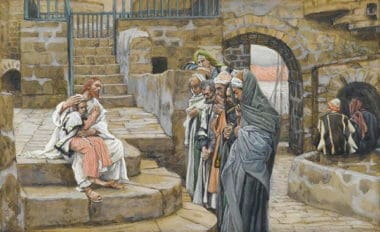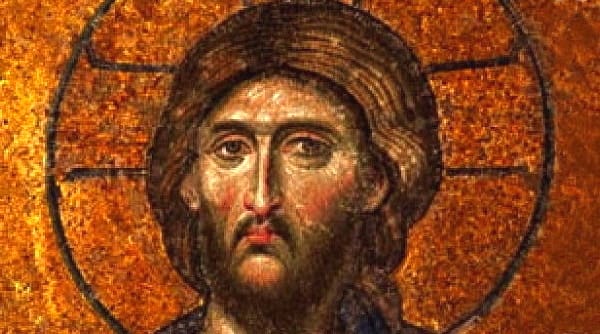“I desire to love you, O my God, with a love that is patient, with a love that abandons itself wholly to you, with a love that acts, and most important of all, with a love that perseveres.” – St. Theresa Margaret of the Sacred Heart
 Mark 9:30-37: After leaving that place they made their way through Galilee; and he did not want anyone to know, because he was instructing his disciples; he was telling them, ‘The Son of Man will be delivered into the hands of men; they will put him to death; and three days after he has been put to death he will rise again.’ But they did not understand what he said and were afraid to ask him. They came to Capernaum, and when he was in the house he asked them, ‘What were you arguing about on the road?’ They said nothing because they had been arguing which of them was the greatest. So he sat down, called the Twelve to him and said, ‘If anyone wants to be first, he must make himself last of all and servant of all.’ He then took a little child, set him in front of them, put his arms round him, and said to them, ‘Anyone who welcomes one of these little children in my name, welcomes me; and anyone who welcomes me welcomes not me but the one who sent me.’
Mark 9:30-37: After leaving that place they made their way through Galilee; and he did not want anyone to know, because he was instructing his disciples; he was telling them, ‘The Son of Man will be delivered into the hands of men; they will put him to death; and three days after he has been put to death he will rise again.’ But they did not understand what he said and were afraid to ask him. They came to Capernaum, and when he was in the house he asked them, ‘What were you arguing about on the road?’ They said nothing because they had been arguing which of them was the greatest. So he sat down, called the Twelve to him and said, ‘If anyone wants to be first, he must make himself last of all and servant of all.’ He then took a little child, set him in front of them, put his arms round him, and said to them, ‘Anyone who welcomes one of these little children in my name, welcomes me; and anyone who welcomes me welcomes not me but the one who sent me.’
Christ the Lord The lesson Jesus has been teaching by his example since the very start of the Incarnation he now teaches with words. The Christian leader leads in the same way that Christ did – by serving, by taking care of those who are weak and helpless, those who are in need, like little children. Greatness in Christ’s Kingdom is equated with humility, an attitude that puts the good of others ahead of one’s own preferences. By defining Christian greatness in this way, the innate human desire to excel and achieve is not stifled, but channeled. He doesn’t tell his apostles, “You shouldn’t strive to be great, to achieve great things,” but he does point out where true, lasting, fulfilling greatness lies – in loving one’s neighbor as Christ has loved them. Jesus is the Servant-Lord; his greatest disciples follow in those demanding footsteps.
That children were so comfortable around Jesus shows yet another aspect of his personality. Jesus too had been a child, and he never forgot or disdained the sensitivity and enthusiasm that characterize children. He never stifled their innate zest for life. The Lord always knew how to meet everyone exactly where they were, inviting them to take a step closer to his Kingdom.
Christ the Teacher Jesus is once again trying to explain to his disciples the true nature of his Kingdom. They are still hoping for Jesus to take Israel’s throne as David did in the old days, and bring political freedom and economic prosperity back to the Jewish people, who were suffering under oppressive Roman occupation. And they imagined that they would be right there with him, his closest companions and most trusted advisors (they were arguing about exactly that – which of them would be prime minister, which would be defense minister, etc…).
But Christ knows that his Kingdom is not like all the other kingdoms of the world; it is the reign of God’s will in the hearts of his followers, which involves self-denial and the cross (a topic that continues to puzzle the apostles); it is a spiritual kingdom that will act like a leaven within the earthly kingdom, bringing souls back into communion with the God who loves them and setting them on the road to heaven, the Resurrection, and eternal life. They just don’t understand it. Even now, after twenty centuries of demonstrable proof, many times we still don’t get it either; many times we want to experience the pure joys of heaven while we’re still on earth, and we resent it when God keeps insisting on the cross. Isn’t the Father wise? Shouldn’t we trust him? Jesus did, and Good Friday paved the way to Easter Sunday.
 Christ the Friend Children are basically energetic balls of needs. They can’t survive on their own; they need someone to take care of them, to watch over them, to teach them – all the time. By setting a child in the midst of his disciples and telling them that when they accept a child they are welcoming him, Christ is explaining that the Christian heart reaches out to others who are in need. It strives not primarily for its own advancement, but looks for ways to meet the needs of others, be they physical or spiritual. Just as Christ saw us wallowing in the confusion and helplessness of sin, and came to save us, so Christians are called to reach out to the needs of those around them.
Christ the Friend Children are basically energetic balls of needs. They can’t survive on their own; they need someone to take care of them, to watch over them, to teach them – all the time. By setting a child in the midst of his disciples and telling them that when they accept a child they are welcoming him, Christ is explaining that the Christian heart reaches out to others who are in need. It strives not primarily for its own advancement, but looks for ways to meet the needs of others, be they physical or spiritual. Just as Christ saw us wallowing in the confusion and helplessness of sin, and came to save us, so Christians are called to reach out to the needs of those around them.
Jesus: It is easy to serve others when they can offer something in return. But that’s not my way. After all, what could a fallen humanity offer to an infinitely perfect God? I came to rescue you who were more helpless in the spiritual realm than even a child is in the physical realm. I want all my followers to do likewise, whether by giving the unpopular colleague a sample of Christian hospitality, or by making the saving truths of Christ palatable to peers who prefer the taste of immorality and false doctrines, or in whatever way my Holy Spirit inspires you. When you welcome those in need, you welcome me.
Christ in My Life I don’t know why humility is so hard for me, Lord. It seems that the dominant décor of my heart is a self-portrait. Why don’t you change me? Lord Jesus, I know you are changing me. But you want me to exercise my love and my virtue by making what little effort I can. Okay, help me to do it: help me to put others before myself. Jesus, I trust in you…
You insist so much on the cross. The world I live in hates the cross. I have to admit, Lord; the world rubs off on me. Reach into my mind and my heart and teach me the mysterious wisdom of the cross. In self-forgetful love lies the fullness of life and meaning. I believe it, Lord Jesus, because you teach it. Increase my faith…
You were always thinking about those around you. Teach me to do the same. You promise to give me the satisfaction I can never find in a frenzied search for ultimate self-indulgence if I follow your example of self-forgetful love. Thank you, Jesus, for guiding and strengthening me. Never take your eyes off of me; show me the way to go…
PS: This is just one of 303 units of Fr. John’s fantastic book The Better Part. To learn more about The Better Part or to purchase in print, Kindle or iPhone editions, click here. Also, please help us get these resources to people who do not have the funds or ability to acquire them by clicking here.
+
Art for this post on Mark 9:30-37: Cover of The Better Part used with permission. Jesus and the Little Child, James Tissot, between 1886 and 1894, PD-US author’s life plus 100 years or less, Wikimedia Commons.





